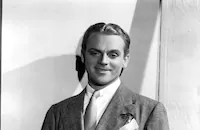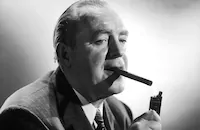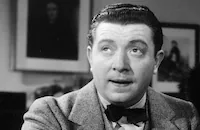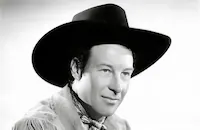Devil Dogs of the Air

Brief Synopsis
Cast & Crew
Lloyd Bacon
James Cagney
Pat O'brien
Margaret Lindsay
Frank Mchugh
John Arledge
Film Details
Technical Specs

Synopsis
Lieut. Bill Brannigan is pleased to learn that fellow Brooklynite Thomas Jefferson "Tommy" O'Toole is coming to San Diego to join the Marine flying corps. To his surprise, the boy he remembers has turned into a self-important young man, and also a great flyer. After Tommy does a series of dangerous stunts over a field where men are in formation, Bill lectures him about his behavior, telling him to go away and return in a fitting manner. Tommy takes off in his plane, but runs out of gas and is forced to make a crash landing near the Happy Landings Cafe. He is immediately attracted to Betty Roberts, the daughter of cafe owner, Ma Roberts, and is unconcerned that she is dating Bill. In spite of his cocky attitude, Tommy does very well at the training school. Bill is assigned as his instructor pilot. On his first flight, Tommy begins to fly stunts, and the plane catches fire. Bill bales out, but Tommy defies his orders and lands the plane, making him a hero. Tommy performs his first solo flight perfectly and then blackmails Betty into attending the solo flight party with him. Bill is angry when he finds that Betty has gone to the dance with Tommy, and the two men fight. Once again, Tommy and Bill must fly together when Tommy's co-pilot is injured on maneuvers. Their plane is damaged, and this time, when Tommy wants to jump, Bill holds the severed wing together at great risk to himself, allowing Tommy to land the plane. They are friends again, but Bill loses his girl to Tommy and so he applies for a transfer to another base.

Director

Lloyd Bacon
Cast

James Cagney

Pat O'brien

Margaret Lindsay

Frank Mchugh

John Arledge
Helen Lowell

Robert Barrat

Russell Hicks

William Davidson

Ward Bond

Gordon Elliott
Olive Jones
David Newell
Helen Flint
Harry Seymour
Newton House
Ralph Nye
Selmer Jackson
Bill Beggs
Robert Spencer

Bud Flanagan
Don Turner
Dick French
Charles Sherlock
Carlyle Blackwell Jr.
Martha Merrill

Ed Brophy
Crew
Earl Baldwin
Malcolm Stuart Boylan
William Clemens
Lou Edelman
Arthur Edeson
Leo F. Forbstein
Arthur Jay Kooken
Lieut. Col. Ralph J. Mitchell Usmc
Jack L. Warner

Videos
Movie Clip



Trailer
Film Details
Technical Specs

Articles
Devil Dogs of the Air
He doesn't stray far from type in Devil Dogs of the Air (1935), a pseudo-sequel to the 1934 sailor drama Here Comes the Navy, a film notable largely as the first pairing of Cagney with Pat O'Brien. The chemistry proved to be great box office and they were brought back (along with director Lloyd Bacon) to scuffle and spar through Devil Dogs of the Air, a peacetime military drama set in the Marine Flying Corps. Once again, O'Brien is the elder, seasoned veteran and Cagney is the upstart cadet under his command.
Lieutenant Bill Brannigan (O'Brien) is a Marine flyer and respected officer who encourages his Brooklyn buddy Tommy O'Toole (Cagney) to come out to San Diego and join up. Cagney makes a memorable entrance as hot-dogging gypsy pilot O'Toole, buzzing the military parade grounds during an official ceremony in a plane with a painted logo that reads "World's Greatest Aviator." Within minutes of arriving he crashes his plane (for a hotshot pilot, he's awfully sloppy about things like checking his fuel), puts the moves on his buddy's girl, Betty (Margaret Lindsay), and makes a mockery of the respect for command. His showboating skill is matched only by his grinning arrogance, which quickly turns the entire base against him.
Reliable Warner character actor Frank McHugh provides the comic relief as ambulance driver Crash Kelly, who spends the movie waiting for someone, anyone, to need his services, even if it means prodding O'Toole and Brannigan to fisticuffs.
The original story is credited to John Monk Saunders, who specialized in aviation stories such as The Dawn Patrol (1930), but the drama is all second-hand, a romantic triangle and the taming of a conceited loner into an officer, if not exactly a gentleman. It's really a showcase for Cagney's cocky charm and smart-aleck attitude and director Bacon, the Warner Bros. workhorse who cranked out four or five films a year for the studio, was an old hand at bringing out Cagney's best in films such as Footlight Parade (1933). Cagney's a regular spark plug as O'Toole, riding roughshod over Brannigan's friendship and authority and courting his girl with a grin.
According to a 1937 Fortune Magazine article (reprinted in Rudy Behlmer's book Inside Warner Bros.), the "service" picture was a specialty of Warner Bros. producer (or supervisor, as Jack Warner called them) Lou Edelman. "Given Pat O'Brien or Dick Powell, the setting, and the technical cooperation of the government, Lou can let the story take care of itself, and brings in some of his assignments at as little as $300,000 apiece." For Devil Dogs of the Air, he had the cooperation of the Marines and Navy, and was allowed to shoot on location at the U.S. Naval Aircraft Base in San Diego.
The stunt flying is top notch, but even more impressive than the solo flying circus antics of the opening scenes, where O'Toole loops, barrel rolls, buzzes the troops and bounces his biplane like he's playing leapfrog, is the spectacle of the third act. There may be no war for the these men to prove their mettle, but the war game exercises of the finale, a simulated beach landing and invasion featuring battleships and the air fleet, proves to be plenty dramatic. Planes lay down thick clouds of smoke over the water to screen the approach of the ships, creating a striking backdrop for the fleet maneuvers, and execute tactical formations with precision flying. Edelman knew how to make the most of military cooperation.
Devil Dogs of the Air was another hit for Cagney and it cemented the pairing of Cagney and O'Brien both onscreen and off. They became close friends and appeared together in seven subsequent features. They even bowed out together, making their respective final screen appearances in the 1981 film Ragtime.
Director: Lloyd Bacon
Screenplay: Malcolm Stuart Boylan and Earl Baldwin; John Monk Saunders (story)
Cinematography: Arthur Edeson
Art Direction: Arthur Kay Kooken
Music: M.K. Jerome and Bernhard Kaun (both uncredited)
Film Editing: William Clemens
Cast: James Cagney (Thomas Jefferson 'Tommy' O'Toole), Pat O'Brien (Lt. William R. 'Bill' Brannigan), Margaret Lindsay (Betty Roberts), Frank McHugh (Crash Kelly), John Arledge ('Mac' MacIntosh), Helen Lowell (Ma Roberts).
BW-86m.
by Sean Axmaker

Devil Dogs of the Air
Quotes
Trivia
Notes
The film's working title was Flying Marines. It was the first Cosmopolitan production at Warner Bros. It was sold as a sequel to Here Comes the Navy, which was produced by Warner Bros. in 1934 and also starred James Cagney and Pat O'Brien and was directed by Lloyd Bacon (see below). The crew filmed on location at the U.S. Marines flying base on North Island in San Diego, CA for three weeks. Film Daily noted that there was standing room only at the film's opening at the Strand Theater. Modern sources list additional crew credits: Costumes Orry-Kelly; Makeup Perc Westmore; and Assistant Director Eric Stacey. Modern sources add the following to the cast: Samuel S. Hinds (Fleet commander) and Joseph Crehan (Communications officer).















